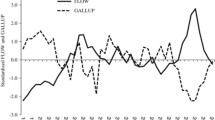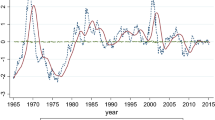Abstract
We investigate the relationship between fundamental market variables and investor sentiment. Our study focuses on empirical aspects that have not been explored by previous studies. We find that sentiment is co-integrated with earnings and sentiment changes cause earnings changes. Under extreme market events, however, sentiment changes tend to move more closely together with stock returns. We also find that the predictive power of sentiment changes increases with subsequent medium-term earnings changes and sentiment changes are asymmetrically more sensitive to high earnings. Our study provides a new insight to stock market participants.





Similar content being viewed by others
References
Amemiya T (1980) Selection of regressors. Int Econ Rev 21:331–354
Antweiler W, Frank M (2004) Is all that talk just noise? The information content of internet stock message boards. J Finance 59:1259–1295
Assaf A (2006) Canadian REITs and stock prices: fractional cointegration and long memory. Rev Pac Basin Financ Mark Polic 9:441–462
Baker M, Wurgler J (2006) Investor sentiment and the cross-section of stock returns. J Finance 61:1645–1680
Barberis N, Schleifer A, Vishny R (1998) A model of investor sentiment. J Financ Econ 49:307–343
Brown G, Cliff M (2004) Investor sentiment and the near-term stock market. J Empir Financ 11:1–27
Chang T, Nieh C (2001) International transmission of stock price movements among Taiwan and its trading partners: Hong Kong, Japan and the United States. Rev Pac Basin Financ Mark Polic 4:379–402
Chen C, Kuo I (2014) Investor sentiment and interest rate volatility smile: evidence from Eurodollar options markets. Rev Quant Financ Acc 43:367–391
Das S, Chen M (2007) Yahoo! For Amazon: sentiment extraction from small talk on the web. Manag Sci 53:1375–1388
Debondt W, Thaler R (1985) Does the stock market overact? J Finance 40:793–805
Engle R, Granger C (1987) Co-integration and error correction: representation, estimation, and testing. Econometrica 55:251–276
Fisher K, Statman M (2003) Consumer confidence and stock returns. J Portf Manag Fall 30:115–127
Fisher K, Statman M (2006) Market timing in regressions and reality. J Financ Res 29:293–304
Gosh A, Clayton R (2006) Debt and equity market reaction to employment reports. Rev Pac Basin Financ Mark Polic 9:431–440
Huth W, Eppright D, Taube P (1994) The indexes of consumer sentiment and confidence: leading or misleading guides to future buyer behavior. J Bus Res 29:199–206
Jansen W, Nahuis N (2003) The stock market and consumer confidence: European evidence. Econ Lett 79:89–98
Klugman S, Panjer H, Willmot G (2008) Loss models from data to decisions. Wiley, Hoboken
Lakonishok J, Schleifer A, Vishny R (1994) Contrarian investment, extrapolation, and risk. J Finance 49:1541–1578
Liao T, Huang C, Wu C (2011) Do fund managers herd to counter investor sentiment? J Bus Res 64:207–212
Otto M (1999) Consumer sentiment and the stock market. Board of Governors of the Federal Reserve System, Washington, DC, pp 1–16
Schmeling M (2009) Investor sentiment and stock returns: some international evidence. J Empir Financ 16:394–408
Shefrin H, Statman M (1994) Behavioral capital asset pricing theory. J Financ Quant Anal 29:323–349
Spyrou S (2012) Sentiment changes, stock returns and volatility: evidence from NYSE, AMEX and NASDAQ stocks. Appl Financ Econ 22:1631–1646
Tumarkin R, Whitelaw R (2001) News or noise? Internet message board activity and stock prices. Financ Anal J 57:41–51
Wang Y, Keswani A, Taylor S (2006) The relationships between sentiment, returns, and volatility. Int J Forecast 22:109–123
Wurgler J http://people.stern.nyu.edu/jwurgler
Author information
Authors and Affiliations
Corresponding author
Rights and permissions
About this article
Cite this article
Baek, C. Stock prices, dividends, earnings, and investor sentiment. Rev Quant Finan Acc 47, 1043–1061 (2016). https://doi.org/10.1007/s11156-015-0530-4
Published:
Issue Date:
DOI: https://doi.org/10.1007/s11156-015-0530-4




